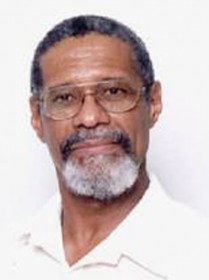-Vice-Chancellor Carrington
The benefits of the country’s low carbon initiative will only be fully realised if it is led by new knowledge that research at the University of Guyana can provide and recently installed Vice-Chancellor Lawrence Carrington adds that the private sector can benefit from such research by “structured investment”.

He was speaking at a luncheon hosted by the Guyana Manufacturing and Services Association (GMSA) on July 3 at the Regency Suites Hotel.
“Guyana’s low carbon economy initiative opens up the possibility for new enterprises and for the expansion of existing business into high yield areas related to their current scope. It also calls for significant thought and research on how the details of the policy can be executed. There is profit lying within the propositions but that profit can only be fully realised if it is led and guided by new knowledge that research in a national university can provide,” Carrington told the assembled private sector officials.
And according to the Vice-Chancellor the local business community can lead the process of equipping the University of Guyana to provide that capability by instituting “structured investment” in its capacity to pursue research and enquiry,
“Research and enquiry are intrinsic to universities. Indeed, without research and enquiry it is doubtful whether an institution of higher education can legitimately claim to be a University”, Carrington told the business forum.
According to Professor Carrington, Guyana needs to pay attention to the evidence that there is a strong correlation between development and investment in higher education. “It is the investment in higher education generally, in research, science and technology that propelled India, China, Singapore, Korea and Japan into their roles as leaders in the contemporary knowledge economy,” Carrington told his private sector audience.
According to Carrington “willingness to sponsor research and to finance development work” is one of the most important ways in which the local private sector can contribute to the development of the University.
“…The resultant interaction between University and work enterprise can propel the institution into lines of research that feed back into its teaching and enrich the experience of students and faculty even beyond those who are directly concerned with the research project,” Carrington added.
Meanwhile, Carrington told the business forum that it was in the interest of the University of Guyana “to hone its output in directions that can be more directly of service to the economically productive sectors of the country.” He said that one way in which the fitness and capacity of the University to work in the environment of Guyana can be enhanced is by creating “working partnerships between the UG and the people who employ its graduates.”
And according to Carrington those working partnerships have to go beyond “the elementary stage of casual attachment of the student as an observer.” The partnerships, he said, must move to “real engagement of students as responsible participants in the work of our productive sector and the feeding of our curriculum with elements that are part of the reality of the business sector’s activities.” Carrington said that one way of accomplishing this could be through the conversion of “the summer job type employment” that enterprises offer into “rigorous internships that are curriculum requirements.”
The University of Guyana Vice-Chancellor told the private sector audience that these partnerships could only be meaningful if some “considerations of attitude” are addressed. He said that rather than see employees requiring time away from work or adjustment of work hours to attend classes at the University as “a humbug, a loss of productivity,” employers should see this as an opportunity for enhancing the quality of their work force and creating bridges between their enterprises and the University, which bridges, he said, “can be exploited for the development of the very enterprise to which the student belongs.”
Carrington told the business leaders that what he wished to see was local companies providing students in their employ with grants to help them through their studies.
Meanwhile, according to Professor Carrington putting questions that had a direct bearing on their respective concerns of business enterprises to a university with a research capacity is one of the ways to get sensible responses as well as a way to build the future capacity of the institution “until its research begins to propel itself in precisely the areas that are of highest interest to the sponsoring sector.” He said that “willingness to sponsor research and to finance development work” is one of the most important ways in which the private sector can develop the University of Guyana to serve the needs of the sector. “The resultant interaction between University and work enterprise can propel the institution into lines of research that feed back into its teaching and enrich the experience of students and faculty even beyond those who are directly concerned with the research project. It would certainly be more economical for an enterprise to finance the equipment and work time for a university department to conduct work on a specific question rather than to build and equip its own laboratory for what could easily be a one shot usage,” Carrington added.
According to the Vice-Chancellor while, in many ways, the spread of local private sector interests relates to the “academic menu” at the University of Guyana and while a match can be made between sub-sectors of business interests and the subject area offerings and competences in the University, the depth of the University’s coverage of the various subject areas “is inconsistent and adversely affected by the difficulty of retaining good staff at uncompetitive reward levels.”
And in a general comment on the fortunes of the University Professor Carrington, who assumed the Vice-Chancellorship in April said that UG had “struggled” to fulfil its mandate. “It has never benefited from the level of resources that would have allowed it to flower and deliver on its potential. The social, political and economic crises of the country have had the effect of restraining the University’s advance, sometimes to the point of paralysis,” Carrington added.





